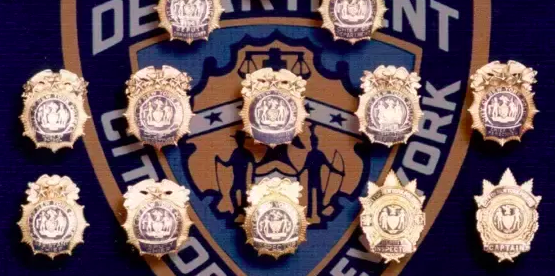Badge Boys, Badge Boys, Whatchu Gonna Do?

If you want to get yourself in trouble, here’s an easy way to do so. First, go on eBay and get yourself a replica police officer’s badge. Then, go find someone to question, telling them you’re a police officer. Show them the badge and continue on as if you’re actually empowered to do what you’re doing.
In almost every context, that’s going to get your arrested by the real cops, as impersonating a police officer is almost universally illegal. And that fake badge? It’s the smoking gun — if you say you’re a cop and you use a fake badge to prove it, you’re almost certainly breaking the law. That’s why, in 2001, officials arrested a self-described actor and businessman named Elliot Sashe.
Sashe wasn’t pretending to be a police officer himself, though. He was charged with the criminal sale and use of a police uniform and badges,” according to the New York Post. He had in his possession more than 6,600 fake badges which, collectively, mimicked the IDs used by officers of every rank and from police departments around the world. Sashe claimed he wasn’t trying to help people pass themselves off as cops, though. Rather, he told the Post that his customers were legit police officers themselves: “This is my business. Every police officer carries a dupe shield.” And it turns out that he might have been right. In 2009, the New York Times reported that “estimates of how many of the city’s 35,000 officers use fake badges vary from several thousand to several hundred.”
Why would a real police officer want a fake badge? Because it’s costly to lose your shield.
NYPD policy at the time, per the Times, punished officers who needed replacement badges, docking them as much as ten days’ pay for the infraction. So officers found an easy way to hedge against that risk. For about $50, you’d go to a guy like Sashe and get a duplicate made. The fake badge had your shield number on it and looked just like the regular badge — other than being a bit smaller — and isn’t obviously fake. (See for yourself: the Times article has a great photo comparing the real and counterfeit ones.) Officers would buy a dupe or two, put the real badge in a safe place, and use the fake for day-to-day business. If you lose the dupe, no big deal; you just get another one from Sashe’s ilk, saving yourself a ton of paperwork, a blemish on your service record, and that hefty fine.
The practice is contrary to police department regulations, but by and large, the police department tended to look the other way — only a couple dozen officers were dinged each year. Further, the penalty was, roughly, the same as one would suffer had they lost their real badge — a fine equal to ten days of pay. And because these police officers weren’t impersonating themselves, there’s no crime attached. So despite being against the rules, the practice continued at least through 2009. (It’s unclear if this still happens today, but there’s little reason to think that it doesn’t.)
The same can’t be said for the people who provide the fake badges, though. Sashe served nearly four years in prison due to that 2001 arrest and got out of the fake badge business after serving his time. (Unfair? Maybe, but in a parenthetical, the Times also notes that “his sentence was served concurrently with another stemming from a state charge in connection with a false claim that his ex-wife had died in the 9/11 attacks.”) That didn’t stop others from getting into the business, though. As one former department chief told the Times, if an officer wants a “dupe badge,” they’re easy to find: “Everybody knows where to go.”
Bonus fact: If you are going to impersonate a police officer (but please don’t!), the Chicago suburb of Robbins may be a good place to try it. Why? In 2013, the village hired a retired cop named Douglas Smith to run their police department, only to fire him a few weeks later. Smith had claimed to have served in various police departments for more than three decades, but further review of Smith’s resume found no such work history. One clue that should have been a giveaway? Per the Chicago Tribune, “his employment evidence included a picture of a fake Los Angeles Police Department badge bearing the serial number 714, rightfully belonging to the fictional Sgt. Joe Friday of ‘Dragnet.'”
From the Archives: Color of the Day: How NYPD officers recognize other NYPD officers when they’re undercover.
